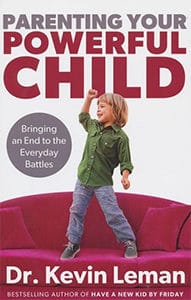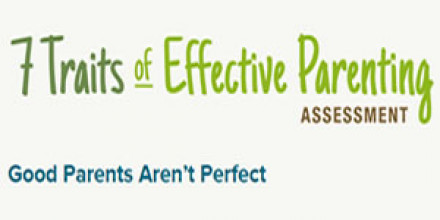Preivew:
Dr. Kevin Leman: You have to understand that all kids want attention. The question is does the child get attention positively or negatively? Once they get negative attention, then they’ll escalate to be a powerful child. So the powerful child, again, says, “I only count life when I win, control, when I dominate.” The attention-getter says, “I only count life when I’m noticed.”
End of Preview
John: Well, getting to the heart of a really complex, uh, parenting matter. That’s Dr. Kevin Leman on today’s Focus on the Family. And we’ve jumped right in again with some great content, uh, pulling from his book, Parenting Your Powerful Child, and his many, many years as a psychologist and an author and speaker. And, uh, Jim Daly is our host. Jim, this is such fundamentally good stuff. There’s always something great to take from Kevin, and uh, apply in my own life as a parent with my kids.
Jim: Well, that’s it. If you have kids at home, uh, Dr. Kevin Leman is the man to go to.
John: Hm.
Jim: Because he has such great wisdom, and it’s rooted right there in Biblical principle, and it helps all of us, as parents, kind of reset the- (laughs) the, uh, compass about what are we trying to achieve here as parents. Uh, even last time, John, we talked about, uh, the types of manipulation that children bring into the home. Uh, Dr. Leman said that that starts at about 18 months. Uh, that was profound.
John: Mm-hmm.
Jim: You know, just to have these little guys and girls will, uh, rebuke the parents (laughs) when they’re trying to feed them or whatever it might be, and it was wonderful. Dr. Kevin Leman, welcome back to Focus on the Family.
Dr. Leman: Yeah. Thank you. You know, potty training, a kid will sense that, uh, when they start to be toilet trained that the parent- if the parent overreacts to that, okay? Hey, parents. Eating, sleeping, and going potty, okay? There’s not a person in this room here at Focus on the Family that hasn’t gone potty today, okay?
Jim: (laughs).
John: (laughs).
Audience of Moms: (laughs).
Dr. Leman: Let’s start with that. But did anybody receive an M&M for going?
John: (laughs).
Jim: (laughs).
Audience of Moms: (laughs).
Dr. Leman: Now, that’s the kinda-
John: No, but it’s not too late.
Jim: (laughs).
Dr. Leman: That’s the kind of lunacy we build in, you know? And, uh, so eating and sleeping and going potty, these natural things, many times we focus on these things. They become power struggles. The kid sees, “Oh, they’re big on that.” And you’ll see a kid who’s toilet trained regress, to use a psychological term, okay, to just gain attention and make the parent pay attention to me. So at 18 months, Jim, yes, they’re powerful.
But at 12 months when you’re trying to put a Pamper on a kid that doesn’t want a Pamper on ’em, notice how this kid can wiggle like a- like a black bass about to leap out of a pond. I mean-
Jim: (laughs).
Dr. Leman: They’re almost flying.
John: (laughs).
Jim: That is great. Hey, we’ve also invited a group of moms to join us in the studio. I- I’m hoping you’ll have questions, ladies, in a little while to, uh, address to Dr. Kevin Leman.
Well, let me ask you this basic question (laughs). I think this is the question. Why do kids misbehave?
Dr. Leman: Kids misbehave for basic reasons. Number one is attention getting. Number two is power. Number three is revenge.
John: Mm-hmm.
Jim: (laughs).
Dr. Leman: You don’t want to see the revengeful kid ’cause these are the kids that are in juvenile detention.
Jim: Ugh.
Dr. Leman: These are the kids who are incarcerated early in life. If you have a right to hurt me in a democratic society, what right do I have…
John: Mmm.
Dr. Leman: … to hurt other people?
Jim: Mm-hmm.
Dr. Leman: If you bring up a kid in Ripoffville, uh, Pennsylvania, and in Ripoffville, everybody’s a thief. There’s not an honest person in the entire town. And then you bring them to Fantasyworld, Colorado, where everyone is honest. There’s not a dishonest person in the whole town. How will the kid behave when he comes to a new environment? When he sees a wristwatch some place that someone left in a restroom, will he stick it in his pocket or return it? He’ll stick it in his pocket. Why? Because he’s learned.
So every kid has a screen play, so to speak, okay? And the first born looks up and sees adults. The second born looks up and sees Little Miss Goody Two-Shoes, which sets up a lot of second children to go in a different direction, okay? The third one figures out, “Hmm, that role is taken, that role is taken. Oh, this role isn’t taken. The procrastinator. I’m gonna be the little badger-like person that they’re gonna have to push and shove and pull to get to do anything. I’m gonna see what they’re made of.”
Jim: How do you as a parent, though, identify that in your children? Do you have to parent differently with each of those styles or those types?
Dr. Leman: Well, I think you do functionally. I mean, why should two kids go to bed at the same time unless they’re identical twins or fraternal twins?
Jim: (laughs).
Dr. Leman: But what do we do? What do we do as convenience? “All right, everyone, listen up. I want everybody in bed now.” Now, why do you do that, Dad? ‘Cause you want to fool around with the missus. Tell the truth.
Audience of Moms: (laughs).
Dr. Leman: You want the kids out of the way, you know? I mean, the- the state of Colorado or Pennsylvania or Texas gonna treat your kid different. Don’t be afraid to treat your kids differently. Here’s the question. Does God treat us differently?
Jim: Mm-hmm.
Dr. Leman: Why did he give identical twins different fingerprints? They have the same DNA.
Jim: Mm-hmm.
Dr. Leman: They’re genetically the same person. Why did he do that? To help the FBI or the Royal Mounted Police?
Audience of Moms: (laughs).
Dr. Leman: No.
Jim: Uh, Kevin, I need to clarify something, because last time and today, we’re talking about- e- even in the open about how far parents should go to try to, uh, help a child succeed and to not allow that child to fail. Uh, what I’m hearing you say is that you really need to take that underpinning away from the child. If they fail, they fail, and there’s a biblical principle related to that. Um-
Dr. Leman: Sure there is.
Jim: Y- you talked last time, in fact, about the spoiled child. And when you, uh, start to take those privileges away to help strengthen the character of that child, do you think, in many ways, the Lord is doing that with us at times?
John: Mm-hmm.
Jim: As adults?
Dr. Leman: Sure. How many times have we … I mean, I- I’ve got a little book I wrote in 57 days, and the publisher said, “Leman, this book must’ve been in your heart.” It was in my heart. It was called The Way of the Wise. But my favorite chapter is, “Lord, You’re the Potter, I’m the Clay. But I Do Have a Few Suggestions.”
Audience of Moms: (laughs).
John: (laughs).
Dr. Leman: And I- I think that’s what all of us as people of faith struggle with is, “Lord, your will, not mine.” Now, let’s face it. As a parent, these are your kids. Here’s the question for all the mommies with us today. Do you know what’s best for your kid? Proverbs 22:6. Train up a child, not train down, your child in a way he should go. That doesn’t mean the way you think he should go. That’s the kicker for most of us. It’s the way God would have your kid go.
So for parents who have a compliant first born, Little Miss Goody Two-Shoes, Honors Society. Oh, she’s such a lovely daughter to have around. And then have you met her little sister, Attila?
John: (laughs).
Audience of Moms: (laughs).
Dr. Leman: Now, here’s the problem. You gotta love these kids. It’s like the kindergarten teacher on the first day of school. The little kid walks in. You know there’s something different about this kid, and you notice the attaché case in his hand. And inside of his attaché case, he’s got a book. You know, James Michener’s, Hawaii. He’s five years old, you know?
Audience of Moms: (laughs).
Dr. Leman: I’m gonna take a wild guess and say this kid’s gonna do okay in school. This kindergarten teacher two minutes later is greeted by a little kid that comes in and says, uh, “Is this the kindergarten?” And the other kid says, “I think he’s inquiring as to whether or not he’s in the right place or not.”
Audience of Moms: (laughs).
Jim: (laughs).
Dr. Leman: Well, if you look at those backgrounds of those kids, they came out of completely different homes.
Jim: Mm-hmm.
Dr. Leman: Parents, if you’ve got a kid who’s a reader, don’t worry about their education. That’s the best, best advice I can give you. Reading is the key. Teach kids where? At your knee. You know, that’s what Deuteronomy reminds us to do as parents. So when you train up kids, you want to train them up with a lot of Vitamin E, which is encouragement, but they need Vitamin N, too, which is no.
Jim: Y- you referred to training down. For those that are just joining us, uh, talk about training down versus training up. What does that mean practically?
Dr. Leman: “You know, if a bird had your brain, he’d fly sideways. What is wrong with you? That is the dumbest thing I ever heard of.” You know, if a doctor says to you, Jim, uh, “Hey, Jim, uh, you reacted to the medication,” That’s not good, Jim. But if he says, “You responded to the medication,” that’s very good.
I think as parents, we need to remember you want to try to respond to kids rather than just react to them.
Jim: Mm-hmm.
Dr. Leman: They’re kids. They’re dumb as mud.
Jim: (laughs).
Dr. Leman: Now, if you don’t believe that, if you’re offended by that statement, please, call your insurance agent this week and ask them this question. Why do I pay so much money for my 16- to 17-year-old daughter or son to drive the car? Your insurance agent will say something to the effect of, “Because they’re dumb as mud.”
Audience of Moms: (laughs).
John: (laughs).
Jim: ‘Cause they drive too fast.
Dr. Leman: So- so- so we do train them. And thy rod and thy staff, they what? They comfort me. But there’s times when a little sheep says, “No, I’m not moving.” What’s the good shepherd do? He takes the rod, gives them a little shot in the tail, moves them along. The rod was used to separate the wool on the sheep to see if there were any little critters on that sheep that shouldn’t be there, but what have we done within the church? We’ve sort of overdone the rod part and forgot the part about comfort.
John: Mm-hmm.
Dr. Leman: These are kids. We’re the psychological blankie for our kids. And you gotta understand that each kid sees life differently. And in many ways, you have to be a different parent in many ways to different kids.
Jim: Well, and you’re touching on something that I think we should pull out, and that is that willful defiance, that willful disobedience, versus just childish irresponsibility. I- is there a distinction there? Uh, let me give you an example. A child that spills milk and is just clumsy. Um, some parents will get on that child to be less clumsy.
Dr. Leman: Yeah. Or to be…Yeah.
Jim: And aggressively. But that may just be that child can’t function well (laughs) with-
Dr. Leman: Yeah, the milk or the orange juice topples. And what do m- “What did you- didn’t I just tell you to be careful? What is wrong with you? I’m telling you. No, go …” There’s your typical reaction. You’re frustrated. You know, when the milk spills, the orange juice spills, we don’t need a- a berating lecture. We need a rag.
Audience of Moms: (laughs).
Dr. Leman: And aren’t you glad that almighty God has this wonderful rag that he just wipes things clean when we say “Father, I’ve fallen short again.”
Jim: Ah.
Dr. Leman: “Is that you, Leman, again?” “Yeah, it’s me. Just call me a tow truck. Get me out of this ditch.” “It’s on its way, fat boy. It’s on its way.”
Jim: (laughs).
Audience of Moms: (laughs).
Dr. Leman: And I think if we have that- if we look at ourselves and realize that we don’t have life’s- all of life’s answers in our back pocket. And there’s times when you look at your son or your daughter and say, “Honey, I don’t know, but let’s talk about this some more.” If you don’t dialogue with your kid … If your 16-year-old says they want to go to a rock concert … Here’s a perfect example, okay? What do most parents say? “Hey, we’re not spending our hard-earned money to send you to hear some goof ball singing a song nobody can understand.” Okay?
Audience of Moms: (laughs).
Dr. Leman: Now, there’s your traditional parent. The parent I’d like to create says, “Oh, who’s performing? Who?” Now, I’m here to tell you, Jim and John, you will not know the name of this group, whoever it is. But “Do you have a CD of them? I’d love to hear it. Hey, come jump in the car with me. Let’s take a lo- I gotta go down to the Circle K anyway. Come on with me,” and put the CD in. As soon as the kid puts the CD in, say, “Turn it up more. Louder.” And talk about it. Now, am I saying let your kid go to everything that comes down the pike? No. But if you don’t dialogue with that kid, he or she is gonna become a slam-clicker, which means they come home from school, they slam their door, they click it shut, and then they begin to text like a woodpecker that’s got ADHD to all their buddies.
Jim: (laughs).
Audience of Moms: (laughs).
Jim: It’s good advice. You’re listening to Focus on the Family. We’re talking with, uh, Dr. Kevin Leman, author of the book, Parenting Your Powerful Child. We also have, uh, 30 or so guests here in the studio. Women and moms who, uh, I’m ready to open up the mics and have you all ask some questions of Dr. Leman.
Dr. Leman: Mm-hmm.
Jim: So let’s do that. Let’s go to the first question.
Mom 1: Dr. Leman, thank you for being here. And so, I have a 17-year-old son, first born. I think he’s full of potential, but he is just failing in classes. And- and it’s so hard not to nag on him, “Do the homework. Do this, do that.” And so I hear your advice about kind of let him feel the consequences, but I’m scared because this is his life that could be affected by the poor grades.
Dr. Leman: Well, first of all, that’s a great question. Thank you for it.
You know, if that’s my son, um, I’m probably gonna have somebody else do this rather than myself. I’m probably gonna have someone at school do it. But I’m gonna suggest to them that they sit down with him and say, “You know, I’m concerned about your grades. I see that you have much more potential than what you’ve shown here. I just want to share this with you for what it’s worth. Someday very soon, someone is going to look at an 8-by-11 piece of paper, or a computer screen, and it’s gonna have some numbers on it, and some grades on it, and maybe some test scores. And they’re gonna make some assumptions about you based solely on what’s on the page.
“We live in a very competitive society. Talk to anybody who’s out in business and doing well and works for a corporation. I got news for you, honey, they’re looking over their shoulder. It’s called downsizing. So this is your life. I don’t want to run your life. You need to make these decisions. Something tells me that you don’t measure up, you don’t do better because you feel pressure that if you did better you’d always have to do better.”
John: Hmm.
Dr. Leman: “And I understand that.” But that first born who doesn’t measure up, many times doesn’t measure up out of fear that if I succeed, I’ll always have to succeed, and that’s fearful.
John: Mm-hmm.
Jim: Let’s go to the next question.
Courtney: My name is Courtney, and I have five children. Four boys and then a little girl. My fourth son is about to turn eight, and there are no consequences that affect him. Literally. He is so powerful; I expect that he’ll be President of the United States. He won’t take no for an answer. He doesn’t need sleep. And as long as everything’s going his way, he’s great. You know, he’s a wonderfully, beautiful hearted child. But when something goes wrong, or I say no, it is the end of the world. And he is not embarrassed to scream, throw himself on the floor at Walmart. I have left him places. He has no problem with that. He said, “That’s okay. I’ll just find a new family.”
Audience of Moms: (laughs).
Courtney: I can’t find a consequence that is strong enough for this powerful child.
John: Hmm.
Courtney: And, again, I know he’ll be successful one day because he truly has this amazing power. But as a parent, it’s- I’m at the end of my rope.
Jim: I think we hear that. Let’s hear Dr. Leman’s response.
Dr. Leman: Well, this kid might do well in a court room someday as a court room attorney, but if this behavior doesn’t change now at age eight, he’s gonna be a lousy husband. He’s not gonna be a good person to be around, okay? And you see these kids where li- if life is sailing on their terms, they’re fine.
Jim: Well, what can she do?
Dr. Leman: Wa- watch it in sports, okay? As soon as something goes wrong, and he has a hissy fit, you say things like … You don’t try to make it right, number one. You don’t try to fix it. You say, “I understand you’re upset. I’ve got to tell you the truth, it’s not a big thing to me.” Walk away. I would pick this kid up at age eight. I’d put him outside, I’d close the door, and I’d lock the door. I’d make myself a cup of tea, and I’d chill. If you do that with a powerful child like this, he will kick your back door like it’s never been kicked before. But I would not open that door until he settled down. Okay?
We hear the anguish in your voice, but we also hear that, “Oh, he’s a great kid. He’s this, he’s that.” I got news for you. You gotta look at that other side, and you gotta understand that this side that’s the bad side, so to speak, has to be corrected or it’s really gonna limit the probability of him being productive as an adult.
Jim: And to be fair, I mean, all of us as parents with our children, I think, all of our children will have that side that we tend not to want to look at.
Dr. Leman: Oh, yeah.
Jim: Yeah.
Dr. Leman: But I call it the bread and water treatment, Jim. I think this kid gets nothing if he’s in my home. “Mommy, would you- would you get me a glass of milk?” Now, this is when things are really fine. He’s great. “Would you get me a glass of milk?” “Uh, no, honey. I won’t.” “Mommy, you always get me a glass of milk.” “Honey, I don’t feel like getting you a glass of milk right now. “I want to create some guilt in this kid. Good guilt that says, “You know what? I’m not happy with the way things are in our home.” And kids of eight understand that. You need to- I call it parental poker. Now, some of you may not like that term. You want to call it parental fish, go right ahead.
Audience of Moms: (laughs).
Dr. Leman: But you have four aces. Your kid wouldn’t have underwear, quite frankly, if you didn’t buy it for him. So who’s kidding who? You have all the gold, so play these cards now at eight before these kids harden up and hit 12, 13, 14, and then it’s really miserable. It’s an- absolutely incumbent that Mom and Dad must be on the same page.
John: Mm-hmm.
Dr. Leman: And lots of times, what you’ll see is you’ll see a powerful parent … You know, there are engineers, are accountants, wherever perfection is paid, you’re gonna find more share of your powerful parents, okay? And if they’re not on the same page, the kids, again, will be fed power from you not being on the same page. And what they’re actually saying is, “I’m angry because you two don’t have your act together.” Well, if you use an educational model like I do and not a medical model, you realize there’s some good news here. That we can untrain some of these things.
John: Mm-hmm.
Dr. Leman: Some of these kids who are the procrastinating type who just dig in. I mean, they will show you that “Nothing you do is gonna affect me.” But these are the kids you gotta say, “Honey, I understand that.”
Jim: Mm-hmm.
Dr. Leman: “But you’re 15 years old. You have three more years to serve in this prison, okay?”
Jim: (laughs).
Dr. Leman: “And at 18, you can fly any way you want. But for right now, this is what you have to deal with. So if you’re responsible in home, responsible at school, yeah, you’re going to have some perks, like driving the car. And if you’re not, that’s never gonna happen.”
Jim: Mm-hmm. Uh, y- you mention though, uh, oftentimes that more strong-willed parent will have certain, uh, dispositions to them. I mean, the accountants, you say, the engineers, the black and white thinkers-
Dr. Leman: Where perfection is paid off, yeah.
Jim: Now, typically, and you know this from your other books. Typically, opposites attract. So the spouse, when you talk about being on the same page, it- that can be hard. And I know for Jean and I, Jean is a scientifically driven person. I can tend to be a bit more laid back in my parenting.
Dr. Leman: Right.
Jim: How do we get on that same page? How do we say, okay, we have to find a middle ground?
Dr. Leman: Well, number one, you don’t act out independent of each other. The two shall become one. I’m married to Mrs. Uppington, the first born, the classy one. She likes four forkers and five forker restaurants.
Jim: (laughs).
Dr. Leman: I loathe those places. I’m a plastic fork person. I’m a hot dog, hamburger person. We couldn’t be more different. But we’re a great team. But with kids, we’ve always been on the same page. And when the kids see that security … See, your kid, whether that kid’s four or 14, likes the mundane. They like the mundane. They like to predictable.
John: Mm-hmm.
Dr. Leman: If you don’t believe that, try tucking in a young kid tonight and leave something out of the routine. The kid turns into Judge Judy.
Audience of Moms: (laughs).
Dr. Leman: “Mommy, you forgot to…” do whatever, you know?
Jim: That’s so true. So true.
Dr. Leman: Sing a song, or tucks this, or do that. So realize that, as adults, your job is to stay on that same page. And, yes, we see life differently. And I would tell every man that’s listening, every man, women are closer to life than men are.
John: Mm-hmm.
Dr. Leman: No matter what your occupation, no matter what the major problem, run everything by your wife first.
Jim: Jean is smiling right now (laughs).
Dr. Leman: (laughs).
Jim: Uh, let’s talk for a moment about, uh, the mom. I mean, there may be a mom sitting right here, and if you’re there and in this place, uh, let’s hear from you. But you feel like, “Wow, I have not done it this way, and I’m feeling guilty. What you’re saying is actually making me feel heavy-hearted. Um, how can I turn that corner now? What can I do tonight when I go home and talk to my husband, to say, “Okay, we’ve got to do some things differently.” Anybody in that spot? You feel like that? Okay, there’s some nodding heads right now.
Dr. Leman: Well, first of all-
Jim: Speak to it.
Dr. Leman: There’s a lot of moms that don’t have a support system.
John: Mm-hmm.
Dr. Leman: There’s a lot of moms listening to us who- who are single parents who have no one in the bull pen. They have to do it by themselves. And for those, they need to be as consistent as they possibly can be. For those of you who do have that help mate, it’s really important that that help mate understands what a job you do. That means you need to get away. You need to go out with your girlfriends. You need to have some time alone. You need to go to a woman’s retreat at your church. Husband will figure it out.
Jim: (laughs).
Dr. Leman: I remember my wife took off for a- a retreat and left me with the infant, Chrissy, and the 18-month-old, Holly. They were 18 months apart, and I reassured her everything would be okay.
Audience of Moms: (laughs).
Dr. Leman: That’s how stupid I was.
John: (laughs).
Dr. Leman: I- it was not okay. I mean, our oldest daughter, Holly, did a … How do I say this? A- a big bah. We called them big bahs.
Jim:(laughs).
Dr. Leman: And- and I’m so old, we didn’t have Pampers, ladies.
Audience of Moms: (laughs).
Dr. Leman: We had cloth diapers.
Jim: Yeah, and they’re not very well fitting.
Dr. Leman: And it was just … I’m not gonna describe it.
Audience of Moms: (laughs).
John: Thank you.
Jim: We got the picture.
Dr. Leman: But it- it was- it was … Thank you, Jim.
Jim: (laughs).
Dr. Leman: It was worse than you could imagine. And I picked her up, and I ran out the back, through the screen door, and took her out in the grass.
John: (laughs).
Audience of Moms: (laughs).
Dr. Leman: And I- I didn’t have a- a wristband on me that said, “What would Dr. Kevin Leman say or do?”
John: (laughs)
Audience of Moms: (laughs).
Jim: (laughs).
Dr. Leman: So I went to the garden hose.
Audience of Moms: (laughs).
Jim: That seems practical.
Dr. Leman: Oh, gosh. You know what? And I pulled that off, and about three days later, Holly told her mother about the special, uh-
Jim: Bath?
Dr. Leman: Shower that Da- that Daddy gave her in the backyard.
Jim: (laughs).
John: (laughs).
Audience of Moms: (laughs).
Dr. Leman: I got in big time trouble.
Jim: Well, that’s nothing what the neighbors said to your wife. (laughs).
Audience of Moms: (laughs).
Dr. Leman: Oh, gosh. But every man needs to walk in a woman’s shoes.
John: Mm-hmm.
Jim: (laughs).
Dr. Leman: I’m a great proponent of MOPS organization. They’re just wonderful people.
Jim: Right.
Dr. Leman: And, uh, I just like to reassure those mommies that, you know, yeah, you don’t have a bunch of people in the grandstand, you know, clapping, and rising up, and calling you blessed. But the work and the time you put with these kids pays off.
Jim: Mm-hmm. Let’s get another question.
Audrey: Hi, Dr. Leman. Thank you for coming.
Dr. Leman: I’ve been watching you ponder.
Audrey: (laughs) I’ve been pondering a lot. Um, I can- my name is Audrey, and, uh, I do confess that I am the stubborn, procrastinating, manipulator child growing up, and I have a 16-year-old son of my own that is a stubborn, procrastinator, manipulator. And he’s six-foot-two, so, you know, spanking doesn’t work anymore. And- or maybe it never did. But, um, we will get into arguments, um, and I can’t remember a time that I have ever given in with this kid. Ever. He’s never gotten his way. I consider it my passion to make his life as miserable as possible (laughs). Um, I’m just joking. But- but he keeps continuing to argue with me, as if he thinks he’s going to win someday. How do we stop (laughs) this?
Dr. Leman: Well, there- there’s two participants in this golden glove event.
Audrey: I know! (laughs).
Dr. Leman: Okay? There’s, uh, Queen Audrey-
Audience of Moms: (laughs).
Dr. Leman: And the little serf, who is six-foot-two.
Audience of Moms: (laughs).
Dr. Leman: Now, I’d be careful, Audrey, because if you got a serf around the house, you can be the queen, but at six-two, I’d be careful.
Jim: (laughs).
Dr. Leman: Uh, let me point out a couple of things. I love your question for a couple of reasons. Number one, you mentioned spanking. If you have a powerful child, one of the worst things you can do is spank ’em. All you’re doing is throwing kerosene on the fire. You want to use other means of disciplining kids. 16-year-olds, I- I would hit them with a car. Not a-
Audience of Moms: (laughs).
Dr. Leman: Not at 50 miles an hour, please.
John: Not physically hit them, but …
Dr. Leman: But I would use things that really- that are interests to a 16, 17-year-old son. Now, what you have to understand is, again, there’s a couple lessons here. Fighting’s an act of cooperation. Notice he knows exactly what to say just to get you fired up on all eight cylinders. Not seven or six. You got all eight cylinders blazing. So he’s learned how to punch in things that just make you- your blood boil. And then you get the “You cannot- you are not gonna win this.” Who’s winning your marriage, those of you who are married? If someone is winning your marriage, marriage isn’t a competitive sport. If someone’s winning your marriage, you both lose. So if someone’s winning this argument, you both lose.
I think just for fun, for a week, you oughta do what Leman suggests, and that is as soon as he starts his dog and pony show and says something outrageous, say, “Oh, why didn’t I think of that? That is awesome.” “Wow. Fascinating.” It’s just like I tell women. When your husbands say really stupid things, just look at them and say, “Wow. Wow.”
Audience of Moms: (laughs).
Dr. Leman: “Unbelievably interesting.”
Audience of Moms: (laughs).
Dr. Leman: “Interesting.” And you’re- you can think, “You’re an idiot.” I’ll l- I’ll give you that, but just don’t say it. So, again, you’ve learned this. You’ve had 16 years of going back and forth on this teeter-totter. It’s never gonna stop. Wait till he brings a woman home to take him away. You’ll be crying your eyes out. You better get this one fixed quick before the wedding comes.
John: Uh, well, you’ve been listening to Focus on the Family with Dr. Kevin Leman, and I’m sure you can see why we wanted to revisit this content. Those are some great questions to really ponder, and we appreciate Dr. Leman’s insight on those topics.
Jim: Well, you know, Kevin is always such a popular guest here on Focus on the Family. He hits it out of the park every time because his parenting content is so relevant and effective. Uh, let me turn to you, the listener. Focus exists to provide resources to help you on your parenting journey, no matter of what season of life you’re in.
John: And we mentioned this last time, but we have a Seven Traits of Effective Parenting assessment, which is really an invaluable free tool. It’s a short quiz. It’ll take just a few minutes of your time, and you’ll see where you’re doing well, and a few action items, uh, for those areas that could use some improvement.
Jim: Another great resource is the book by Kevin Leman. It’s called Parenting Your Powerful Child: Bringing an End to Everyday Battles. This book gives great advice for parents in need of some help and encouragement.
When you make a monthly pledge today, and no amount is too small, we’ll send a copy of Dr. Leman’s book as our way of saying thank you for doing ministry with us. And if a monthly pledge is too much, we can send it to you for a one-time gift as well.
Let me just tell you, when you order that book through Focus, the proceeds go right back into helping couples on the verge of divorce, families in crisis, bewildered parents, frightened mothers considering abortion, and others who just need a touch of hope.
With Thanksgiving and Christmas just around the corner, you can share that hope as well as the healing, the peace, the grace, and the joy that Jesus Christ came to give us all. And through your support of Focus on the Family, you can come alongside those who are struggling and give families hope. Your support is critical to help us finish the year strong and be ready to reach even more families in 2023. We’re so grateful to have you partner with us.
John: It’d be terrific to hear from you right now, because we have a special year end matching opportunity, uh, going on. And that means your gift is going to be doubled. Uh, your donation will go twice as far to bring healing and redemption to even more families.
To take that free Seven Traits of Effective Parenting assessment, and to donate and get your copy of Parenting Your Powerful Child, call 800, the letter A, and the word FAMILY. 800-232-6459. Or visit focusonthefamily.com/broadcast.
On behalf of Jim Daly and the entire team, thanks for listening to Focus on the Family. I’m John Fuller inviting you back as we once more help you and your family thrive in Christ.




















